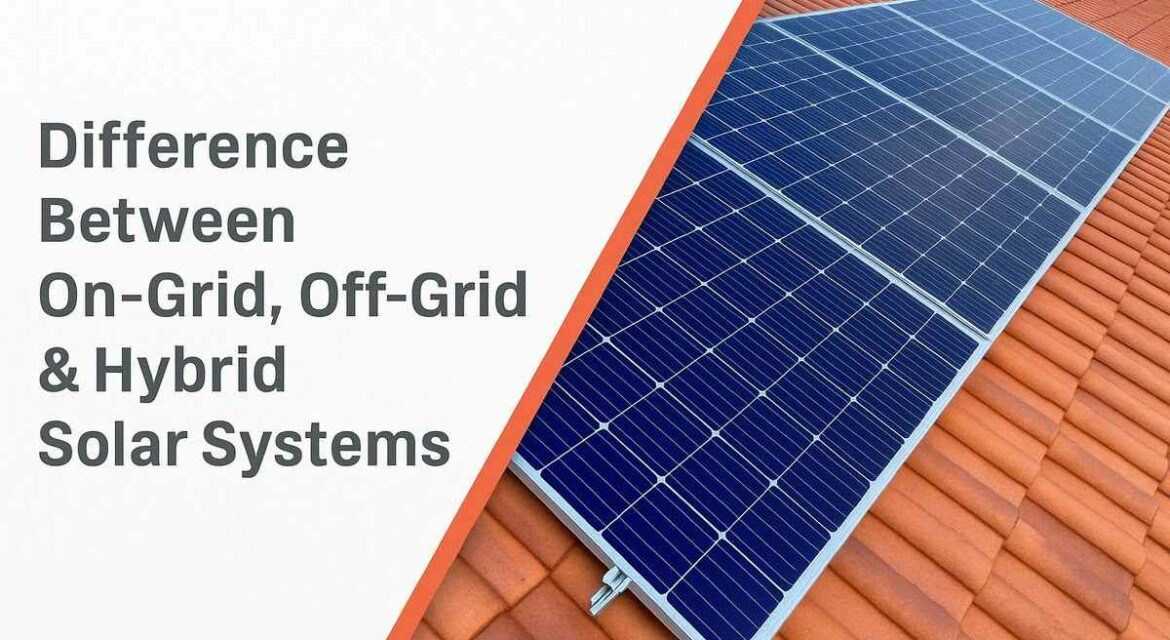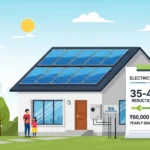If you’re planning to switch to solar energy, one of the first questions you’ll face is:
Should you choose an on-grid, off-grid, or hybrid solar system?
Each system has its own benefits, limitations, and ideal use cases based on your location, energy needs, and budget. In this blog, we break down the differences in simple terms to help you make an informed decision.
What Are These Solar System Types?
| Type | Grid Connection | Battery Backup | Best For |
| On-Grid | Yes | No | Homes with reliable power supply |
| Off-Grid | No | Yes | Remote or rural locations |
| Hybrid | Yes | Yes | Areas with frequent power cuts |
1. What Is an On-Grid Solar System?
Also known as a grid-tied system, this type of setup is directly connected to the local electricity grid. The system produces solar electricity during the day, and any excess is sent back to the grid through net metering.
To learn more about how this helps lower your energy bills, read Why Rooftop Solar in Delhi NCR Is a Smart Investment in 2025.
Key Advantages:
- Lower installation cost (no battery needed)
- Saves money through net metering
- Easy to maintain
Limitations:
- Does not work during power cuts
- Completely dependent on grid availability
2. What Is an Off-Grid Solar System?
An off-grid system works independently from the utility grid. It stores energy in batteries for use when sunlight is unavailable, such as at night or on cloudy days.
Key Advantages:
- 100% power independence
- Works even in areas with no grid access
- No electricity bills
Limitations:
- Higher upfront cost due to batteries
- Requires accurate system sizing
- Batteries require maintenance and replacement every few years
Not sure what lifespan to expect? Check out What Is the Lifespan of Solar Panels & Inverters in Indian Conditions.
3. What Is a Hybrid Solar System?
A hybrid solar system combines the best of both worlds. It is connected to the grid and also includes battery backup. Solar power is used during the day, excess energy is stored in batteries, and any surplus is exported to the grid.
If you want to compare hybrid and on-grid systems in terms of returns, also read Solar Power vs. Conventional Power: Why Switching to Solar is the Smart Choice.
Key Advantages:
- Works during power outages
- Uses battery at night, reducing grid dependence
- Eligible for net metering and subsidies
Limitations:
- Higher initial cost due to batteries and hybrid inverter
- Slightly complex to install and maintain
Which System Should You Choose?
| Your Situation | Recommended System |
| Live in Delhi NCR with reliable grid power | On-Grid |
| Farmhouse with no electricity connection | Off-Grid |
| Urban home with frequent power cuts | Hybrid |
Still confused? Here’s a helpful read: Solar is Right — But How Do You Choose the Right Solar Provider?
Government Subsidy Benefits
Both on-grid and hybrid systems are eligible for subsidies under national schemes. To know what you can claim in your state, visit
Solar Subsidies in India 2025: State-Wise Incentives & How to Claim Them
Can You Upgrade Later?
Yes. If you start with an on-grid system, you can later upgrade it to a hybrid system by adding batteries and a compatible inverter.
Need Cost Details?
Want to understand the cost differences between these systems?
Check out How Much Does It Cost to Install Solar Panels in India?
Maintain Your Solar System for Best Results
No matter which system you choose, performance depends on regular maintenance. Learn how to keep your solar panels working efficiently by reading Maximize Solar Panel Efficiency: The Importance of Professional Service & Maintenance
Choosing the Right Equipment
Different systems require different types of panels and inverters. Know what’s best for your setup with
What Are the Best Solar Panels for Home Use in India?
Final Thoughts
Choosing between on-grid, off-grid, and hybrid solar depends on your specific needs:
- Want lower bills and live in a city? Go for On-Grid
- Live in a remote area without reliable electricity? Choose Off-Grid
- Need power backup and savings together? Pick Hybrid
SIA Engineering offers personalized site visits and expert solar system design to match your needs, location, and budget.






